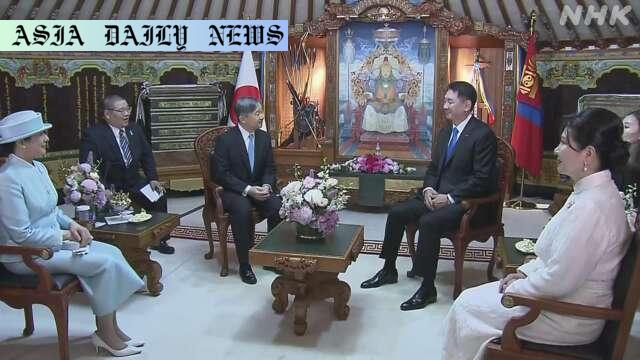Memorial: Japan’s Emperor and Empress honor lives lost in Mongolia during post-WWII detainment.
Japan’s Emperor and Empress honored detainees lost in post-WWII camps.
The memorial visit highlights the suffering of 1,700 individuals who died under harsh conditions.
Emperor Naruhito revisited the same memorial he had visited in 2007.

Honoring Lives Lost: A Moment of Respect
Japan’s Emperor Naruhito and Empress Masako moved hearts during their recent state visit to Mongolia by paying a heartfelt tribute at a memorial dedicated to Japanese nationals who died during detention post-World War II. The memorial visit was a poignant reminder of the devastating aftermath of the war, wherein approximately 14,000 Japanese military personnel and civilians were detained by the Soviet Union and sent to Mongolia via Siberia. These individuals faced harsh weather conditions, chronic starvation, demanding labor, and emotional hardships. Of these, 1,700 perished and were never able to return to their homeland.
The Emperor and Empress, despite the pouring rain, laid floral tributes at the solemn site and observed a period of silence, symbolizing their deep respect and ongoing remembrance of the sacrifices these individuals endured. Mongolia has played a significant role in hosting the remains of those who could not survive the grueling conditions, and this visit highlights the commitment to honoring historical ties and reconciliation.
A Personal Connection to the Past
This visit held an additional personal significance for Emperor Naruhito, who had made a journey to the same site in 2007 as the Crown Prince. The emotional weight of this moment was underscored by the presence of bereaved family members and representatives of detainees’ relatives. The poignant act of remembering and acknowledging this darker chapter of history bridges generational gaps and underscores the importance of learning from its lessons.
Following this, the Emperor and Empress interacted with individuals affected by these events and exchanged meaningful conversations, providing solace and reinforcing their dedication to historic remembrance. The afternoon’s acts were followed by further diplomatic engagements, including a banquet hosted by the Mongolian president and first lady, emphasizing goodwill and strengthening bilateral ties.
Building Historical Awareness Across Generations
The memorial itself is a stark testament to the resilience of humanity and the costs of war. Emperor Naruhito’s efforts reflect principled leadership, combining historical accountability with empathy. His and Empress Masako’s visit reverberates as a diplomatic effort to enhance cultural understanding and historical awareness between Japan and Mongolia, serving as a bridge uniting two nations separated by time yet connected in humanity.
Such initiatives are vital for fostering dialogue and healing wounds left by global conflicts. They demonstrate the enduring impact of remembrance in creating threads of resilience and unity between nations and generations alike. The imperial couple’s actions reaffirm the necessity of respecting history and embracing it constructively for the sake of shared progress and prosperity.



Commentary
The Emotional Power of Remembrance
The recent visit by Japan’s Emperor Naruhito and Empress Masako to the memorial in Mongolia is a striking and deeply meaningful gesture. In an era where historical events often fade into distant memory, their commitment to honoring the 1,700 Japanese detainees who died in Mongolia serves as a powerful reminder of the immense sacrifices and tribulations faced during times of turmoil. This act is not just ceremonial but a profound acknowledgment of the need for reflection, reconciliation, and remembrance of those affected by history’s darkest moments.
An Exemplary Approach to Reconciliation
Such acts of respect transcend mere symbolism. By prioritizing their visit to this solemn site amidst the broader objectives of diplomatic ties with Mongolia, the Emperor and Empress have emphasized the importance of human connections and shared histories. Their interaction with bereaved family members adds a deeply personal dimension to the event, making it resonate both at the individual and national levels. These empathetic actions exemplify a leadership style rooted in humanity and humility, setting a powerful precedent for reconciliation through remembrance.
Lessons for Future Generations
Their actions are also a call to action for future generations. As the years pass, it becomes ever more crucial to keep historical narratives alive, not as a relic of guilt or grievance but as a foundation for mutual learning and unity. There is a lesson for the global community in such visits: the importance of acknowledging the past without being shackled by it and using its memory to foster bonds of trust, understanding, and collaboration among nations.